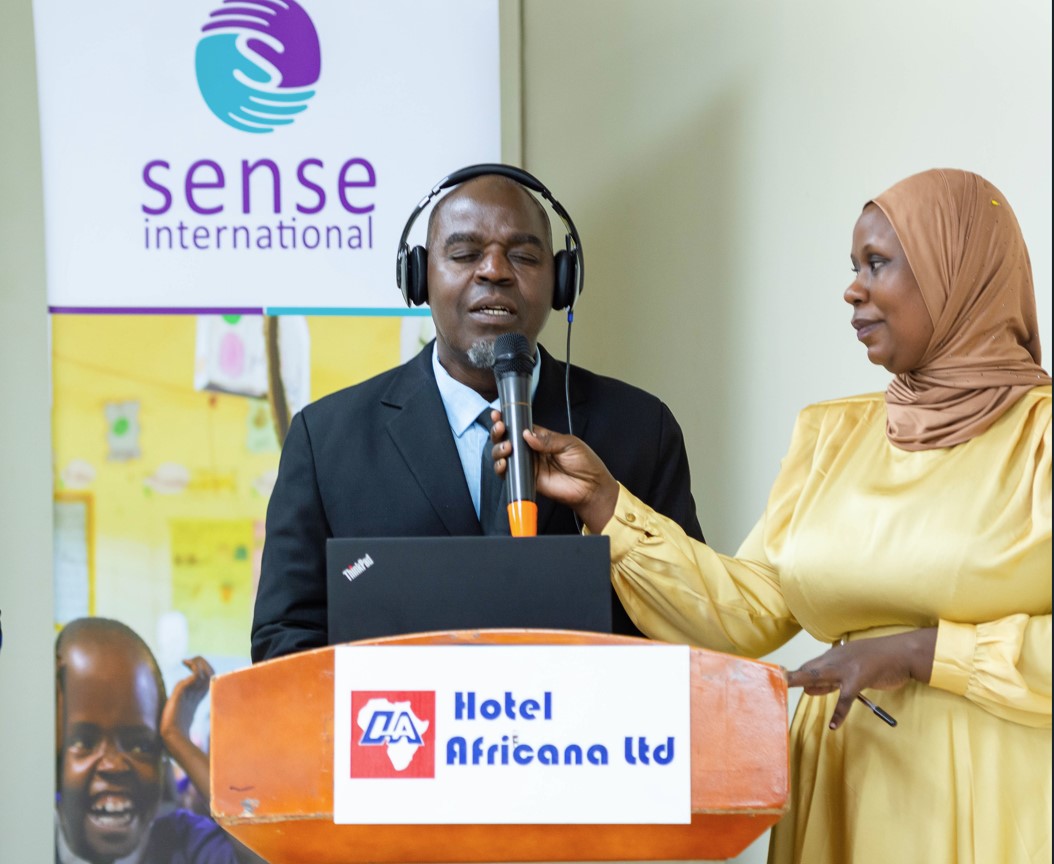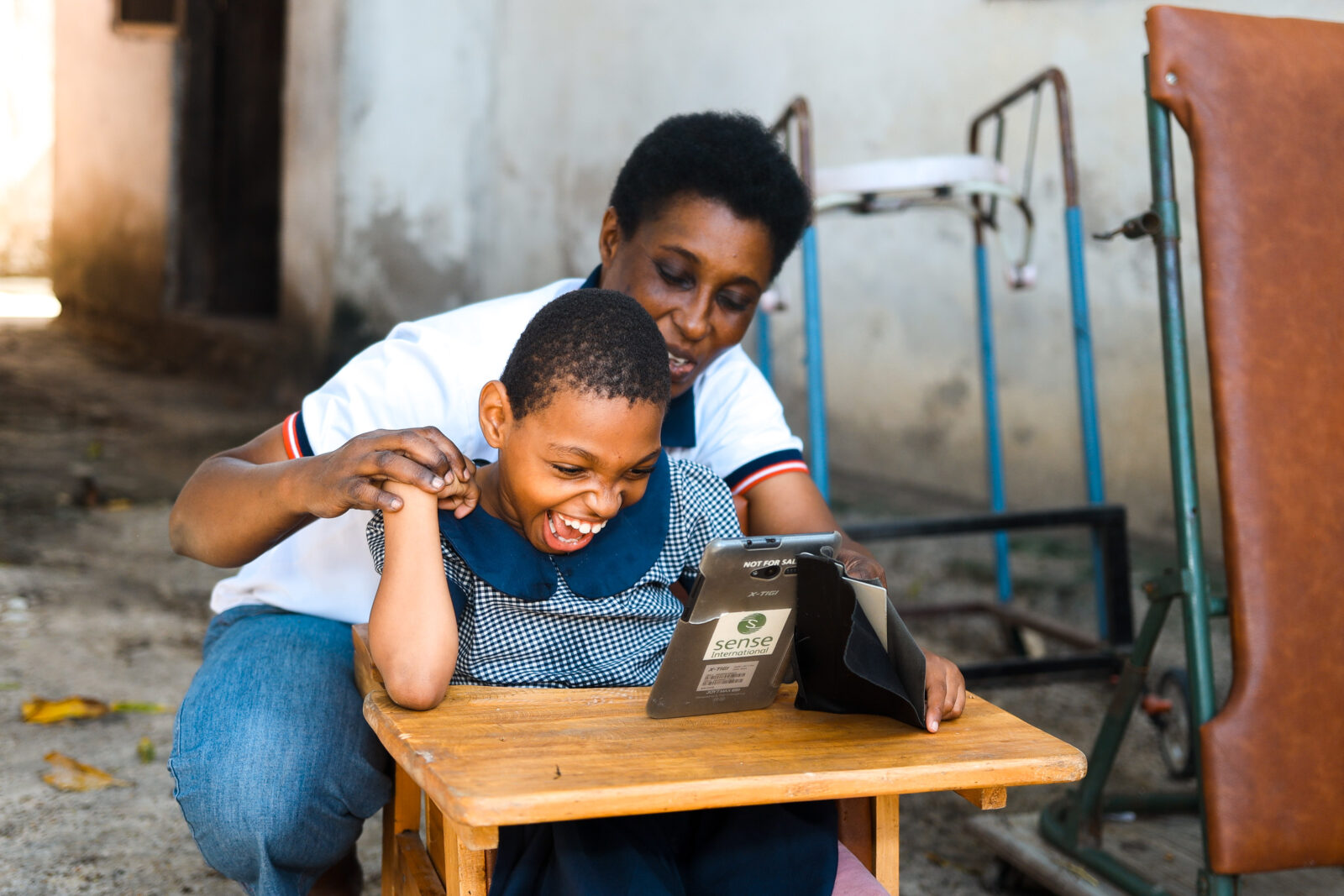An estimated 1.3 billion people – about 16% of the global population – currently experience significant disability.
World Health Organisation (WHO): Disability and Health factsheet 2023
Welcome to our Global Deafblindness Resource Hub, an online platform that provides people with deafblindness (PwDB) and those who support them, with accessible content, information and resources.
The Hub will offer a ‘one stop shop’ into information that can guide and navigate people with deafblindness and their wider support networks to understand and connect more widely with information, local signposted services and networks.
Working directly with people with deafblindness, we want to reach beyond the borders of our eight countries, supporting them to connect with others and to the world around them.
How to use the Global Deafblindness Resource Hub
Descriptive Transcript
Narrator: You can access the Global Deafblindness Resource Hub using a smartphone, tablet or computer.
Visual description: The homepage of the Global Deafblindness Resource Hub appears against a teal background. At the bottom of the screen a smartphone, tablet and laptop appear.
Narrator: Here are the steps to follow:
Visual description: List of the steps to follow appears on the screen
Narrator: Go to a search engine and type Global Deafblindness Resource Hub, then wait for the results to load.
Visual description: A visual representation of typing in Global Deafblindness Resource Hub and pressing Enter while the results load.
Narrator: Click on the very first link at the top, that will take you to the Global Deafblindness Resource Hub, you can choose any of the seven languages available on the Global Deafblindness Resource Hub.
Visual description: The screen opens search results with the Global Deafblindness Resource Hub highlighted in yellow at the top. The cursor clicks on the link and opens up the homepage which focuses on the section the section for the seven languages
Narrator: There are plenty of resources, including books, guides, videos and articles from eight different countries, you can also find signposted local information such as news, other organisations that offer support and services, mobile apps and assistive technology to help to connect with the world.
Visual description: The screen moves further down focusing/zooming in on examples of the different types of resources named as well as the signposted information.
Narrator: To find resources, click on the resources heading and you will see a list of resources available in your chosen language.
Visual description: The cursor moves to the navigation menu and selects ‘resources’ which brings up the resources page.
Narrator: Use the filter to select the type of the resources you want, as well as the country. By clicking Apply, it will display results based on your selection.
Visual description: The cursor moves down the screen clicking on the named sections to show how results are shown on the page.
Narrator: You can also find information about how to make your device more accessible and add features such as increasing text size and colour contrast by clicking the Accessibility support.
Visual description: The cursor moves to the navigation menu and selects ‘Accessibility Support’ which brings up the Accessibility Support page.
Narrator: To listen to a content on a laptop or computer, right click anywhere on the page and select the ‘Read Aloud’ option.
On a phone or tablet, tap the three dots in the top right corner and choose to ‘Listen to this page’.
Visual description: The cursor moves down the Accessibility Support’ the cursor right brings up the options and selects the Read Aloud option which is highlighted in yellow.
It then brings up a close and focus of a mobile phone with the homepage and highlights the three dots at the top right corner and selects the ‘Listen to this page’ option which is highlighted in yellow.
Narrator: And that’s how you access the Global Deafblindness Resource Hub.
Visual description: The screen shows a large version of the website homepage. Then the screen changes to a teal background with the disclaimer:
Accessibility settings and options may vary depending on the device or operating system in use
Enabling people with deafblindness to live, learn and thrive.
Descriptive transcript for Global Resource Hub animation
Narrator: A staggering 1.3 billion people experience a significant disability and are 35% less likely to have essential digital skills for life. Their ability to participate in our ever-evolving society heavily depends on accessible environments and technology.
Visual description:
Image of the earth. Part of the Earth is engulfed in a yellow colour which animates into a pie chart., with the yellow slice representing 35%
‘1.3 billion people’ text animates onto screen (typewriter style). Images of people pop in underneath the pie chart.
Camera tracks downward to reveal three digital assets including a phone, tablet and laptop.
Narrator: Only 1 in 5 children with deafblindness are enrolled in primary school, and are ten times less likely to be employed than their peers.
Visual description:
Cut-out of children racing illuminated with a yellow outline around them . They race past the buildings into an empty white space. The camera moves to the next screen showing a young man, illuminated with a yellow outline around him, against a backdrop of a city.
Narrator: The Global Deafblindness Resource Hub aims to change this by offering accessible content, resources, and information in 7 languages, connecting and empowering individuals with deafblindness and their support network.
Visual description:
Camera tracks across and ‘Global Deafblindness Hub’ text animates onto screen and is highlighted (typewriter style). Various assets appear on screen (digital iconography such as a computer and laptop). The digital icons disappear and the word “Resource” appears in seven different languages around the text
Narrator: Meet Alice from Tanzania. Alice is a nine year old girl with deafblindness
Visual description:
Alice appears in the middle of the screen illuminated with a teal outline.
Narrator: She lives in rural Tanzania with her family and has many siblings who support her in her day-to-day activities and play.
Visual description:
Alice moves to the right-hand side and an image of young children with their hands raised, sat at their desks in a classroom, appears on the left. The screen transitions to reveal five children in school uniform running out of school, with yellow outline around them. Alice is still on the right hand of the screen.
Narrator: For many years, Alice was not able to attend school, delaying her social and intellectual growth. Her world consisted of only her immediate surroundings.
Quick zoom out to reveal the school next to Alice’s house. The other children run off to the left towards the school (cut out sliding animations). The camera zooms in on Alice, left at home alone.
Narrator: That is until Sense International got involved.
Visual description:
Alice and the house slowly fades out and ‘Sense International’ animates in the centre of the bubble.
Narrator: Sense International introduced Alice’s mother to the Global Deafblindness Resource Hub.
Visual description:
Text disappears and camera zooms into image of two African women (an educator and Alice’s mum). Alice’s mum is holding a tablet. Digital assets (laptop, tablet and mobile phone) appear above both women with screenshots of the Global Deafblindness Resource Hub.
Narrator: She was shown specialised training videos, equipping her with guides and sensory stimulation activities for Alice.
A tablet rotates from a flat position to upright and displays screenshots of the Hubt. Elements showcasing ‘guides’, ‘sensory stimulation’, and ‘activities’ pop onto the screen.
Alice has been thriving ever since and regularly attends school, using the hub with her special educator. Alice also participates in community activities, and has friends.
Multiple dotted lines spring out of the tablet, leading to various windows. The first shows Alice and her educator, alongside a frame showing scrolling on the Hub. There is a screenshot from a video on the Hub, and the words “classroom toolkits” and “assistive technology” pop out in blue bubbles around the screen. The camera zooms out and moves to the next window, zooming in to show Alice’s mum holding a tablet with a zoom frame showing scrolling on the Hub. The words “Parent Guides”, “Well being tips” and “books” pop out in blue bubbles around the screen. It zooms out and quickly moves to an image showing Alice and a friend reading together, and pans across to an image of a group of children sat down looking into a tablet held by a young girl.
Narrator: The Global Deafblindness Resource Hub can become a window to the rest of the world for many adults and children, just as it did for Alice.
Visual description:
Images disappear one by one, leaving the text ‘ The Hub’ and the tablet with a blank screen. Camera zooms into the tablet, where an image of the Earth appears with some teal ‘rays’ (like sunshine rays) coming out of it.
Narrator: Together, we can build accessible spaces and resources, ensuring everyone, like Alice, is included and connected.
Visual description:
Image of Earth fades away and on a white background the Sense International logo appears. The words “Connect. Learn. Share” pop up swiftly along with the website link (https://deafblindnes.info/) . Finally the ‘Global Deafblindness Resource Hub’ logo and ‘Nelumbo Stiftung’ logo appear in the middle bottom of the screen.
Help to get started
What is deafblindness
Find out more about deafblindness including different types of deafblindness, its causes in newborn children and adults, diagnosis, signs of deafblindness, treating the underlying causes and managing the condition.
How to support a child with deafblindness in their early years
The first years of a child’s life can be a steep learning curve for parents. Find answers to some of the most common questions – asked by parents and carers of young children with complex disabilities.
Ways of communicating with a person with deafblindness
It’s never too late to start learning a new way of communicating. Find out all the different ways to communicate with a person with deafblindness.
The United Nations Convention on the Rights of People with Disabilities
Read this brief presentation of some of the rights of people with disabilities, as they are described in the articles of the United Nations Convention on the Rights of People with Disabilities.
Resources for teaching, caring, learning and thriving
- Life and learning
- News
- Books
- Specialist and technical
- Mobile apps
- Assistive Technology
- Understanding deafblindness
- Support organisations
A place where your story matters

To every person with deafblindness, every parent, every young advocate—you are not alone. There is now a place built with your needs at heart. A place where your story matters. A place where your journey is understood.
Dr. Abdul Busuulwa
Sign up to receive updates about our Hub, new resources and our work around deafblindness.

